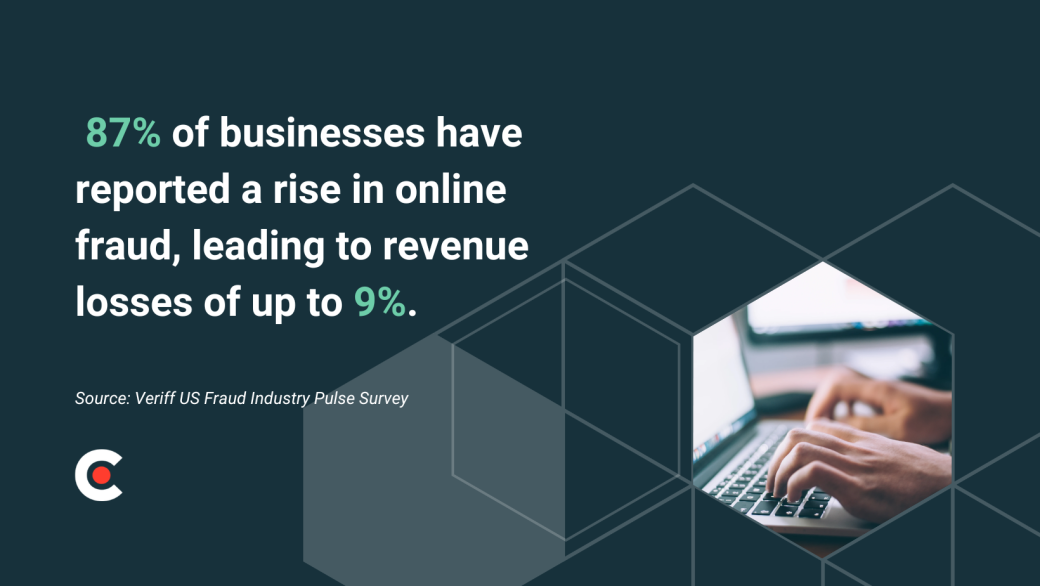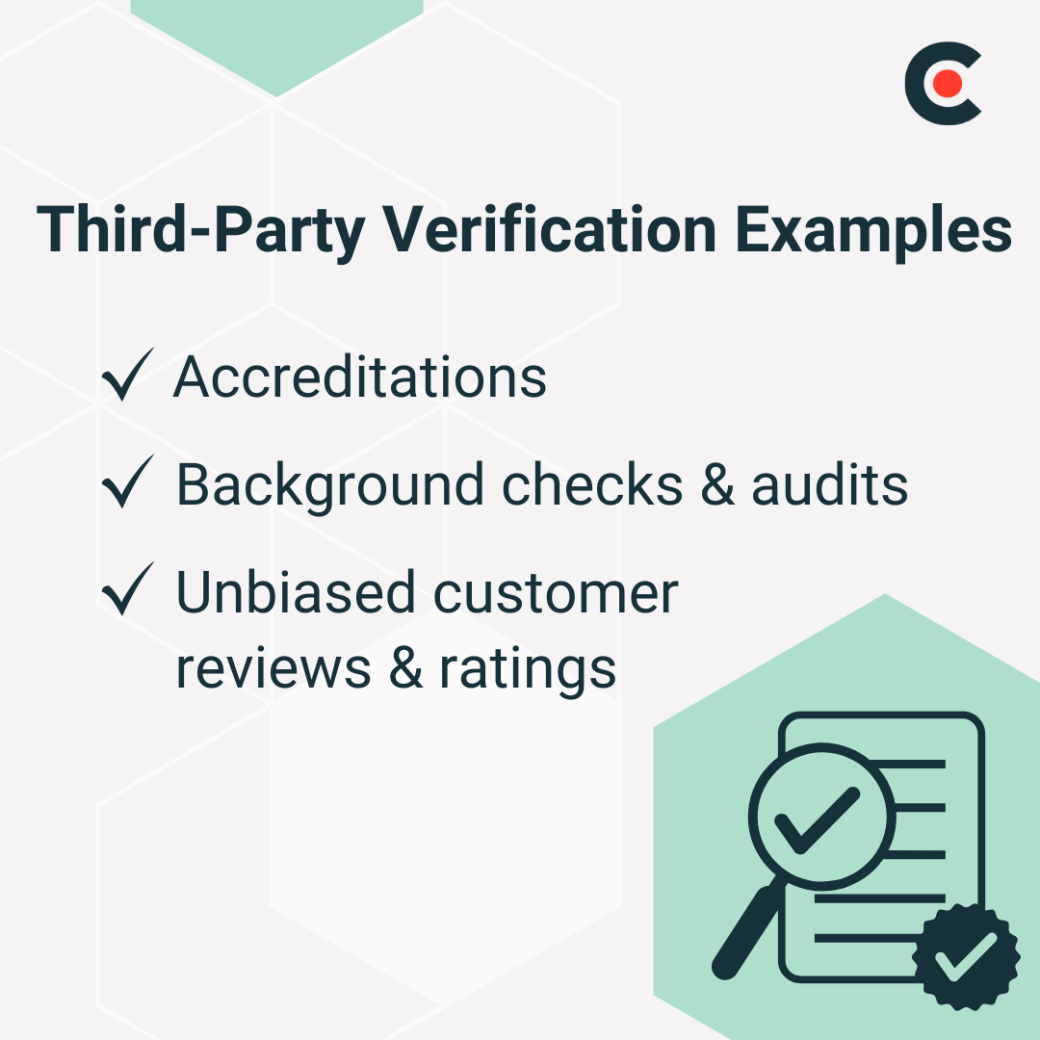

Updated April 9, 2025
Trust is hard to build and easy to lose. This rings especially true for businesses that must work hard to build customer trust. It all starts by developing business credibility: the perception that an organization is authentic, honest, and acting in good faith. Third-party verification can significantly bolster an organization's trustworthiness by providing an impartial and thorough assessment of its practices and claims.
Customers care more than ever about business credibility. According to a 2024 survey, 90% of Americans reported that it is important for them to trust the brands they buy from.
As organizations increasingly operate online, fraud has become one of the biggest threats to business credibility — especially with the rise of artificial intelligence (AI). According to a 2024 Upwind survey, 87% of Americans are concerned about AI helping scammers, and 55% believe scams are getting worse.
Looking for a Digital Marketing agency?
Compare our list of top Digital Marketing companies near you
These fears are completely valid. A recent report by Modern Retail revealed that scammers are using AI to create fake product photos and evade counterfeit detectors. Scammers have also used this technology to build fake websites and send convincing emails impersonating real B2B businesses, duping them into sharing their financial data or sending payments.
This can make many consumers hesitant to buy a product or service from a business that has not been properly vetted. Fortunately, third-party verification can offer a robust safeguard for consumers and businesses. By enlisting the help of external auditors or verification services, businesses can foster a reliable image that reinforces their credibility and alleviates consumer anxieties.
Third-party verification involves an outside entity validating that an organization’s actions and claims are accurate and legitimate. It’s like having an auditor double-check that you’ve filed your taxes correctly and haven’t fudged any numbers.
This process is especially important for B2B businesses because their clients often entrust them with large orders and sensitive data. Plus, third-party verification can help organizations stand out from competitors who haven’t been verified.
Third parties use many strategies to validate information. For example, they might verify your marketing claims — are those products really eco-friendly? — or assess the quality of your services. They could also perform background checks and audit your financial records.
Many well-known businesses use third-party verification to bolster their reputations and earn customer trust. Lyft, for instance, partners with the screening service Checkr to conduct background checks on drivers. This collaboration improves safety and reassures riders, guaranteeing they’re only matched with drivers who have been vetted by an independent, external organization.
Similarly, Airbnb uses several third-party databases and platforms to verify the identities of hosts and guests. This process ensures that guests only rent from legitimate hosts and vice versa. It also helps the platform catch potential issues, such as fraudulent bookings made with stolen credit cards or IDs.
By partnering with third-parties to verify their businesses, these companies were able to not only enhance their reputations but also solidify trust with their customer base.
You can’t expect customers to just take your claims at face value — you need to prove that you’re telling the truth. By having an outside party validate your business, you’ll demonstrate your trustworthiness and reassure skeptical customers.
Companies in all industries can benefit from third-party verification. It has many advantages, including fraud protection and enhanced credibility. Ultimately, investing in credibility marketing can have a profound impact on an organization's success, driving customer loyalty, retention, and overall brand reputation.
The evidence is clear: fraud is on the rise. A 2024 study commissioned by Featurespace found that 30% of American consumers — or almost 80 million people — have lost money to scams since 2020.
Many businesses have fallen victim to fraud, too. According to the Veriff US Fraud Industry Pulse Survey, 87% of businesses have reported a rise in online fraud, leading to revenue losses of up to 9%. This fraud takes many forms, from embezzlement to phishing attacks.

Many clients are already on the lookout for common scams — like fake websites and phishing emails — but third-party verification gives them extra peace of mind.
Consumers may look for reviews posted on third-party platforms to make sure a business is legitimate. For example, Google Business Profile and Tripadvisor allow customers to share their experiences with companies. By checking these testimonials, customers can avoid giving their money and data to fraudulent companies and scammers.
Third-party verification is also key to building credibility. Just think about it: Are you more likely to trust an organization that claims to do the right thing, or one that can prove it?
In today's competitive digital landscape, where consumers have countless options at their fingertips, cultivating trust is not just beneficial but essential for sustained growth and long-term success. By investing in third-party verification and other trust-building strategies, businesses can differentiate themselves, foster strong customer relationships, and thrive in a trust-driven market.
Suppose a company touts its sustainably-sourced clothing and ethical manufacturing practices. Customers may reasonably feel skeptical about these promises, especially if they’ve seen other businesses make similar claims without backing them up.
Businesses can verify their commitment to sustainability by earning certifications from independent organizations like Fair Trade Certified and the Rainforest Alliance. These nonprofits audit businesses to make sure that their products meet rigorous criteria for eco-friendly practices. For example, Fair Trade Certified requires factories to pay fair wages and follow strict safety guidelines to protect workers. By proving that a company follows these standards, they’ll strengthen their business’s reputation.
Third-party verification can also enhance your business’s credibility because it is significantly less biased, particularly in comparison to your marketing materials. Most business owners believe that they offer amazing products and services — after all, you wouldn’t pour all your time and energy into something you don’t believe in. An outside evaluator can use objective standards to assess your business fairly, which can appeal to potential customers trying to find the best product or service for them.
Third-party verification may seem mystifying, especially if you’re used to handling everything internally. Here are three examples of third-party verification that businesses can use to strengthen their credibility.

Many professional organizations offer accreditation for businesses that meet established quality standards. This process typically involves two steps: a thorough assessment of a business’s operations and products by a third-party provider, and routine follow-up evaluations to make sure the business continues to meet all the accreditation criteria.
Clutch Verified, for example, is an accreditation that validates the legitimacy of your business through a rigorous multi-step vetting process. Clutch Verified proves that your organization upholds strict industry standards and strives to consistently deliver quality work, helping discerning clients feel confident when hiring potential partners.
For buyers looking to hire reliable service providers, this can set your business apart by enhancing your credibility and boosting your online visibility. It affirms that your business remains at the forefront of best practices and consistently delivers high-quality results. Consequently, possessing Clutch Verified status can be a pivotal factor in securing long-term growth and success within competitive marketplaces.
Background checks and audits allow businesses to verify the reputation and track record of potential partners. Generally, background checks look for a variety of factors to assess the legitimacy and reliability of a potential partner or vendor, including the company’s registration and legal status, legal history, credit history, ownership, and reputation.
Through this process, business leaders can uncover any red flags, such as financial instability, legal disputes, or unethical practices. Identifying these issues early on helps avoid partnerships with companies that could create legal or financial problems down the line. Crucially, background checks will also verify that potential partners have required certifications and licenses and comply with certain regulations.
To qualify for Clutch Verified Premier status, businesses must pass a business credit check, maintain a high average client rating on Clutch, have at least 3 verified reviews, and pass an additional business history check. For business leaders looking to hire a vendor for an upcoming project or long-term partnership, Clutch Verified signals that a potential partner has a history of delivering quality services, meeting deadlines, and maintaining professional ethics.
Thus, in choosing Clutch Verified providers, business leaders can mitigate risks associated with new partnerships, ensuring that they engage with entities that have proven track records of reliability and integrity.
Before the internet, customers often consulted with their friends and family before buying a product or service. Today, online reviews have become one of the most influential sources of information for consumers. In fact, a 2024 CardRates survey found that 99% of Americans looked at reviews before making an online purchase. Additionally, 92% believe positive reviews increase trust in a product or brand.
Partnering with a third-party review platform can help you gather genuine and impartial reviews. These external providers often verify that customers have purchased the products or services they’re reviewing, improving the credibility of these testimonials.
As the leading B2B services marketplace, Clutch is the go-to platform for business leaders looking to find objective and verified client reviews. Before publishing, Clutch’s team verifies each review to confirm the reviewer’s identity, ensure there’s no conflict of interest, and that the project occurred. Every review includes details about the project, including the cost, timeline, and results, helping buyers understand a potential partner’s ability to deliver.
Listing your company on Clutch and collecting client reviews that highlight your past experiences and capabilities can boost your online visibility and earn buyer trust.
With the rise of fraud and skepticism surrounding online businesses, third-party verification provides a crucial safeguard that enhances a company’s credibility. By validating claims, ensuring transparency, and offering unbiased assessments, third-party verification helps businesses stand out in a crowded market, providing customers with the assurance they need to trust and engage with your brand.
By participating in Clutch Verified’s scrupulous vetting process, you can demonstrate that your business is legitimate, that it consistently meets industry standards, and is committed to delivering quality services. In enhancing your business credibility, potential clients can feel confident in hiring your services.


